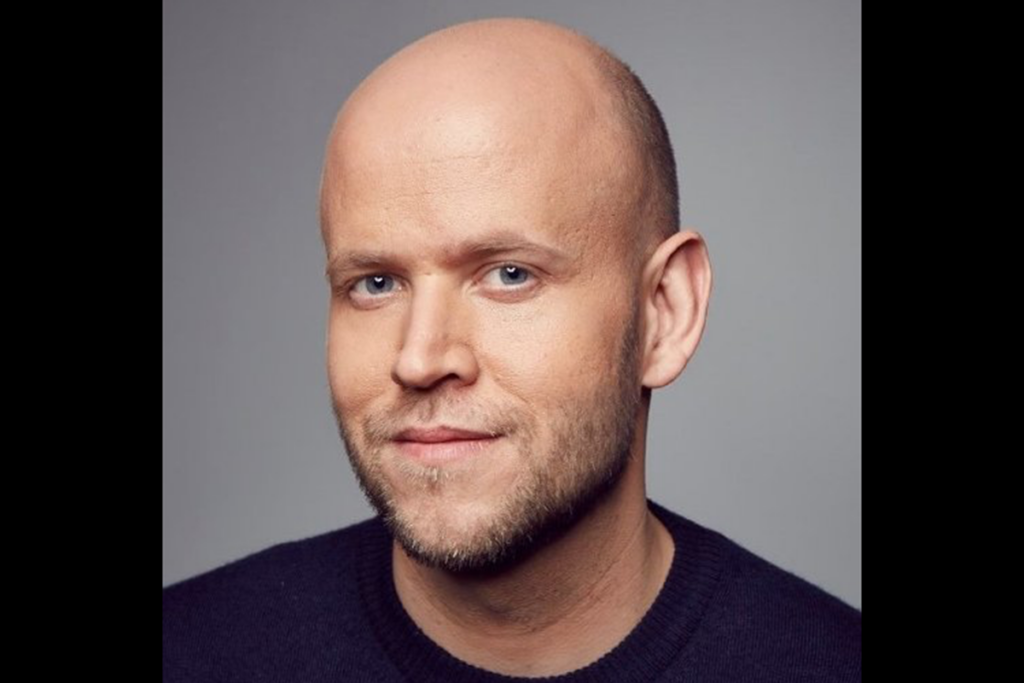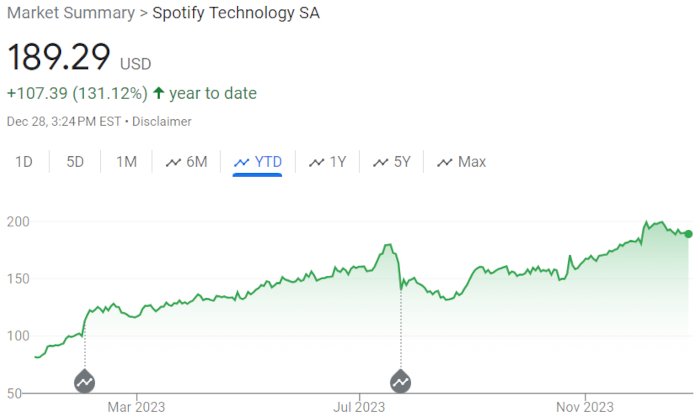Spotify Stock (NYSE: SPOT) Is Up 130% Since 2023’s Start — What Does 2024 Have in Store?


Spotify stock is up over 130 percent from 2023’s beginning.
2023 is nearly in the books, and since the year’s start, the value of Spotify stock (NYSE: SPOT) has spiked by north of 130 percent. Now, investors and observers are speculating about SPOT’s 2024 outlook.
At the time of writing, Spotify stock was worth $189.29 per share, up from just under $82 per share in early January. Meanwhile, with November of 2022 having seen SPOT plummet into the $70 range for the first time, the music streaming platform’s current stock price also represents a close to 150 percent valuation boost from late December of 2022.
Of course, SPOT’s triple-digit 2023 growth has coincided with a rally throughout the broader market as well as adjacent share-price hikes for other high-profile tech companies. Among the latter are Meta (an almost 190 percent improvement from 2023’s beginning), Snap (nearly 94 percent), and Netflix (about 66 percent).
But independent of the market-wide resurgence (which could, some believe, come to a screeching halt in 2024), Spotify has made several noteworthy moves on the year.
Spotify’s 2023 At a Glance
January – Layoffs hit six percent of Spotify’s workforce, and podcast exec Dawn Ostroff departs
February – AI DJ launches in the US and Canada before a wider rollout in August, and podcast higher-up Max Cutler exits
April – Spotify Live and Heardle shutdowns announced
June – Meghan Markle and Prince Harry podcast deal officially ends, Soundtrap is sold back to its founders, and approximately 200 podcasting layoffs are announced
July – Spotify raises prices in over 50 markets, including the U.S.
August – Spotify unveils a global partnership with WPP
September – AI-powered podcast translations, Daylist, and Showcase banner ads debut
October – Spotify posts Q3 profit, says it “will consistently be in the black moving forward”
November – A new Google agreement and a retooled royalties system, set to go into effect in 2024, are formally announced
December – Spotify lays off 17 percent of its workforce, cancels multiple original podcasts, and announces the departure of CFO Paul Vogel
Long-anticipated price increases came to fruition in a number of markets over the summer, for instance, and Spotify execs have signaled that further bumps (which the major labels steadfastly support) could be forthcoming in certain nations.
Notwithstanding Spotify’s professed commitment to continued profitability, only time will tell whether the service, which said it had 226 million paid users and 574 million total MAUs as of Q3, will in actuality remain in the black.
Beyond this dominant subscribership position, the company is grappling with considerable fixed costs, thin margins, and stiff competition, one top investment firm emphasized in October.
Also looming for Spotify are contract negotiations for The Joe Rogan Experience. The platform in 2020 paid a reported $200 million for the exclusive rights to the program, which remains its most popular podcast.
Though the controversy surrounding the tie-up is largely in the rearview, the market – as well as Spotify’s operational goals and podcast spending – has changed dramatically in the interim. Dawn Ostroff, the architect of the JRE deal and different pacts, departed the company in January.
Lastly, Spotify’s new royalties model, including far-reaching changes like a minimum-stream threshold tracks must hit before they can begin accruing recorded payments, is poised to go into effect in the new year.
DMN has explored the model’s impact in detail. And while the revamped system won’t immediately affect Spotify’s bottom line – the business will still part with the same portion of overall revenue – logic suggests that the sweeping changes at hand could lay the groundwork for other significant pivots moving forward.
Link to the source article – https://www.digitalmusicnews.com/2023/12/28/spotify-stock-2023-gains/
Recommended for you
-
WALDORF Q – Large unique original 24bit WAVE/Kontakt Multi-Layer Samples Library
$14,99 Buy From Amazon -
MUSTAR Electronic Drum Set, Electric Drum Sets for Beginners with 8″ Mesh Drum Pads, 10″ Cymbals, Kick Pedal, Drum Stool, Drum Sticks, USB MIDI Connectivity, 180 Sounds & 15 Kits (4 Pads, 3 Cymbals)
$259,99 Buy From Amazon -
Arabian World Spirit – Large unique WAVE/Kontakt Studio Samples/Loops Library.
$14,99 Buy From Amazon -
RAP Forever – Large Unique WAVe/Kontakt samples/loops studio Library
$14,99 Buy From Amazon -
YAMAHA HS5 2-Way 70W Bass Reflex Bi-Amplified Studio Monitor (2-Pack) Bundle (2 Items)
$399,98 Buy From Amazon -
52 Pack Acoustic Panels 1 X 12 X 12 Inches – Acoustic Foam – High Density- Soundproof Studio Wedges – Charcoal
$39,95 Buy From Amazon -
Rhythm Bb Clarinet 17 Nickel Keys Woodwind Band & Orchestra Musical Instruments for Beginners Includes Case, Stand, 10 Reeds and Cleaning Kit-Black/Silver keys
$139,99 Buy From Amazon -
DigiTech FS3X Three-Function Foot Switch
$39,00 Buy From Amazon













Responses